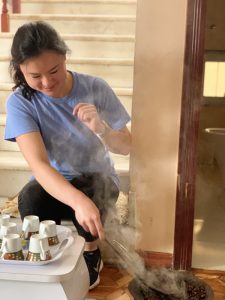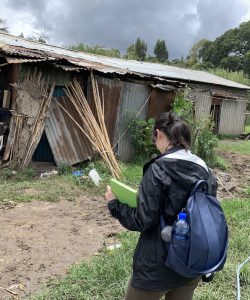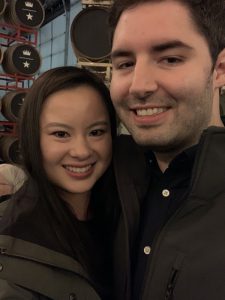 Welcome to another installment of FSHN Research Journeys, which follows the research of graduate students in the Food Science and Human Nutrition department at the University of Florida. Today’s guest poster is Mari Schroeder, a first-year graduate student earning her Ph.D. in Food Science under the mentorship of Dr. Michelle Danyluk. Read on to learn why food safety trainings for farmers are essential and how Mari’s work to develop alternative delivery methods can transform accessibility to these trainings.
Welcome to another installment of FSHN Research Journeys, which follows the research of graduate students in the Food Science and Human Nutrition department at the University of Florida. Today’s guest poster is Mari Schroeder, a first-year graduate student earning her Ph.D. in Food Science under the mentorship of Dr. Michelle Danyluk. Read on to learn why food safety trainings for farmers are essential and how Mari’s work to develop alternative delivery methods can transform accessibility to these trainings.
Mari: Finally, a long-awaited food safety training with updated information for handling produce has just come out. Every produce farmer across the state should know about it. But for some farmers running small- to medium-sized operations, finding the time to learn about this crucial development is next to impossible.
Barriers to Attending Trainings

Many farmers with small- to medium-sized operations cannot afford to take time off to attend these training sessions as they might not have the personnel to keep their operations running. Or, they may be working a second or third job to support their income. However, food safety trainings are imperative for farmers to attend. Not only do food safety protocols protect public health by reducing food safety risks, but they also help protect farmers’ businesses. These businesses could suffer irreversible damages, to their reputation and finances, if they are associated with a foodborne outbreak.
Types of Food Safety Trainings
Currently, food safety trainings offered to farmers cover a wide array of topics ranging from growing tomatoes in your backyard to canning at the commercial level. Two of the most common trainings produce farmers may need to attend are the Good Agricultural Practices training and the Produce Safety Alliance training. Both of these trainings require either in-person or synchronous attendance. In these trainings, farmers learn about the compliance guidelines they must meet to mitigate food safety risks.
By working to meet the needs of our farmers, we are hoping to contribute to the strengthening of our food supply chain.
Because extension or university faculty or staff typically provide these trainings, the trainings are usually held during the traditional business hours of 9am to 5pm. These hours may be difficult for farmers to attend if they have work outside of farming. Yet some produce buyers require farmers to attend these trainings, which are also necessary if farmers sell more than $25K of produce each year. Even without these requirements, farmers and customers benefit from these trainings as they decrease the risk of produce contamination. My research into alternative methods of food safety trainings is key to boosting their accessibility.
Mari’s Journey to a Career in Food Safety

My path to this research area is a circuitous one. I am from Madison, Wisconsin, but I moved to Kentucky for my undergraduate degree in Food Science at the University of Kentucky. One of my main goals was to obtain a degree that would allow me to help people receive basic necessities. I majored in food science because I originally intended to go to medical school, and I thought food science expertise would set me apart from other candidates. However, after talking with one of my professors, I realized I was much more interested in food safety and extension work. In addition, this work still allowed me to help people. I enrolled in UKY’s Food Science Master’s program under Dr. Paul Priyesh Vijayakumar, where I focused on food safety in alternative food networks.
After completing my master’s degree, I ended up at UF by a series of small-world coincidences. In kindergarten, I was close friends with a girl who lost her brother to a foodborne pathogen. My mom swears this is why I chose to pursue food science, and maybe she was right. My friend’s family moved shortly after her brother’s death, and we lost touch.
During my master’s program, I decided to pursue a Global Health Certificate which required me to complete an international internship. To find an internship, I spoke with my epidemiology professor, who said that her sister-in-law was a food science professor and was looking for interns for a project in Ethiopia. Long story short, that professor was the mother of my aforementioned friend in kindergarten, and we reconnected when I joined her in Ethiopia. She encouraged me to speak with Dr. Michelle Danyluk about a Ph.D. position, and that’s how I joined the UF community.
How Alternative Delivery Methods for Food Safety Trainings Can Help Farmers

I am excited to be working with Dr. Danyluk and her team on developing alternative methods of delivery for food safety trainings. Through my research, I have an opportunity to help strengthen food safety from the beginning of the supply chain. This project was developed based on feedback from multiple focus groups with small farmers and observations from previous training events.
Findings so far emphasize the need to establish trainings that can be accessed remotely so that they have minimal interference with farmers’ daily operations. This project is important because it equips farmers with the knowledge and tools they need to mitigate food safety risks and protect their businesses. Therefore, to meet these farmers’ needs, we are working on developing online-based trainings that can be completed asynchronously. By working to meet the needs of our farmers, we are hoping to contribute to the strengthening of our food supply chain.

Mari Schroeder spends her weekends playing frisbee golf with her fiancé and spoiling her four fur babies who are thriving in the Sunshine State. She is also a crochet fanatic and can still win a handstand contest against the gymnasts she coaches and judges.
Note: Some images in this post were taken prior to national guidelines of face coverings and social distancing.
Header caption: Extension Agent Mace Bauer (right) and a watermelon farmer examine a soil moisture monitoring device. UF/IFAS Photo by Tyler Jones.
Want to read more about the research of first-year graduate students in the FSHN at UF? Check out our FSHN Research Journeys page!
Recent Posts:
Aiding the Florida Citrus Industry: Using Kombucha to Combat Devastating Citrus Greening Disease (Dongjoo Kim, Food Science, working toward an MS in Food Science and Human Nutrition)
 2
2
